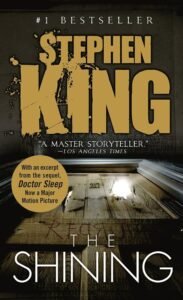“The Shining” by Stephen King is a classic horror novel that tells the story of Jack Torrance, an aspiring writer and recovering alcoholic, who takes a job as the winter caretaker of the isolated Overlook Hotel. Jack moves to the hotel with his wife, Wendy, and his young son, Danny, who possesses psychic abilities known as “the shining.”
As winter sets in and the hotel becomes cut off from the outside world, Jack’s mental state deteriorates, influenced by the malevolent forces within the hotel. The novel explores themes of isolation, addiction, and the supernatural, building tension as Jack descends into madness.

Key Takeaways:
1. The Effects of Isolation: The novel explores the psychological effects of isolation, both physical and emotional. The Overlook Hotel’s isolation exacerbates Jack’s existing struggles with anger and addiction, leading to his eventual breakdown.
2. Addiction and Madness: “The Shining” delves into the theme of addiction, particularly Jack’s battle with alcoholism. The novel portrays the destructive impact of addiction on both the individual and their loved ones, as well as the potential for relapse under stress.
3. The Power of the Supernatural: The hotel itself is a character in the novel, filled with malevolent spirits and dark history. King uses the supernatural elements to heighten the sense of fear and foreboding, blurring the line between reality and the paranormal.
4. The Innocence of Childhood: Danny’s psychic abilities, or “shining,” serve as both a blessing and a curse. The novel contrasts Danny’s innocence with the dark forces at work in the hotel, highlighting the vulnerability of children in the face of adult conflicts and dangers.
5. The Horror of Domestic Violence: The novel also touches on the theme of domestic violence, as Jack’s increasing instability leads to violent behavior toward his family. King examines the terror of living with an abusive partner, amplified by the supernatural influence of the hotel.






Discussion about this post